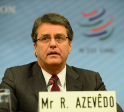Negotiators reached a trade deal on a limited series of issues WTO Ministerial Conference in Bali (3–6 December 2013), one of these being trade facilitation. Based on a quantitative assessment taking into account the detail of the last proposals circulated, we argue however that the design of the negotiation led the DDA to a dead end. Yvan Decreux, Lionel Fontagné +++ More on trade negociations and even more in French |
- Swapmania
Christophe Destais - Negative interest rate on bank deposits at the central bank: an option for the ECB?
Urszula Szczerbowicz
- On the Impact of Oil Price Volatility on the Real Exchange Rate - Terms of Trade Nexus : Revisiting Commodity Currencies
Virginie Coudert, Cécile Couharde, Valérie Mignon - MIRAGE-e: A General Equilibrium Long-term Path of the World Economy
Lionel Fontagné, Jean Fouré, Maria Priscila Ramos - Fiscal Consolidations and Public Debt in Europe
Gianluca Cafiso, Roberto Cellini - Tariff Liberalization and Trade Integration of Emerging Countries
Anne-Célia Disdier, Lionel Fontagné, Mondher Mimouni - What Did Happen in the DDA? Quantifying the Role of Negotiation Modalities
Yvan Decreux, Lionel Fontagné - Public-Debt Financing in the case of External Debt
Gianluca Cafiso
- Journal of International Management
Home-host country distance in offshore governance choices
Julien Gooris, Carine Peeters
Immigration in OECD Countries - Conference
December 6, 2013
SPOTLIGHT ON ... Europe : From Fragmentation to Financial Integration
December 16, 2013
Bali: Saving private WTO As a result of pragmatism and intensive diplomatic efforts during the last months, the WTO sealed in Bali the first global trade in its eighteen-year long history. Although sky-high figures have been mentioned as to the potential benefits of the agreement on trade facilitation, its practical achievements are likely to remain limited. But the real benefits probably lie elsewhere, namely in preserving the negotiating function of the WTO. This organization is an extremely valuable asset for the multilateral trading system, and while negotiating new rules is not its only function, it is an indispensable ingredient of the organization’s credibility. In this sense, the agreement reached in Bali is worth celebrating. Then comes the serious question: now that the tool is saved, what to do with it? The world economy experienced dramatic changes since the Doha Round was launched. The challenge is now to update the negotiating agenda and procedures so as to accommodate the new economic clout of emerging economies, the widespread development of global value chains and the growing concerns surrounding food security. This is the condition to make Bali’s success a first step toward improved governance rules for the world trading system. Sébastien Jean |
- Contact us
- Our other sites
 |
ISSN: 1255-7072
Editorial Director : Antoine BouëtManaging Editor : Dominique Pianelli












